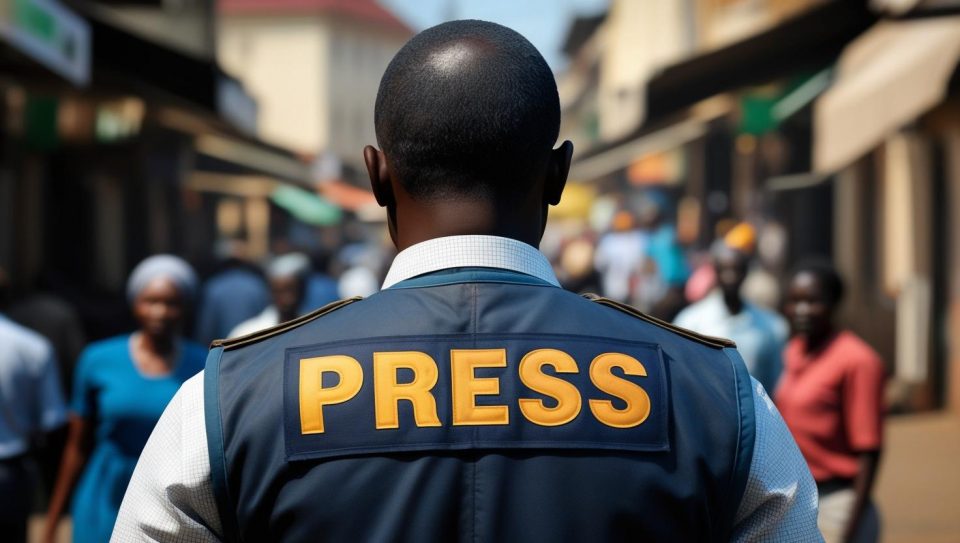Photo caption: An illustrative image of a press man. Photo generated using AI
NIGERIA finds itself at a critical juncture as the world marks World Press Freedom Day on May 3, under the theme “Reporting in the Brave New World–The Impact of Artificial Intelligence on Press Freedom and the Media”.
While global discussions focus on the transformative effects of AI on journalism, Nigeria grapples with a more immediate and pressing concern: the erosion of press freedom under the guise of legal frameworks and governmental overreach.
The Nigerian media, once a formidable force against colonial rule and military dictatorships, now operates under a veneer of freedom.
Beneath this façade lies a reality where journalists are routinely harassed, detained, and prosecuted for performing their constitutional duties.
The Cybercrimes (Prohibition, Prevention, etc) Act of 2015, initially designed to combat cyber threats, has become a tool for silencing dissent and stifling investigative journalism.
Despite amendments in February 2024 intended to safeguard journalists, the law continues to be wielded against them. Sections 24 and 27(1)(b) have been particularly instrumental in targeting media professionals.
In March 2024, brutal military personnel forcefully abducted Segun Olatunji, the editor of FirstNews, from his home in Lagos. The officers whisked him away to Abuja over a story in the newspaper about the defence chief. Olatunji said he was tortured in detention for doing his job.
Initially, the military authorities denied the abduction, but later released Olatunji after public pressure.
In September 2024, four journalists were charged under these provisions for reporting on alleged financial improprieties involving a prominent bank executive. Such actions underscore a disturbing trend where the state apparatus is employed to intimidate and suppress the media.
The case of Daniel Ojukwu, an investigative journalist detained for over a week without trial, further exemplifies this misuse of power.
His arrest, linked to a report exposing government corruption, drew widespread condemnation from civil society and international organisations.
Yet, such incidents are not isolated. Since the enactment of the Cybercrimes Act, at least 25 journalists have faced prosecution under its provisions.
Beyond legal persecution, Nigerian journalists contend with physical threats and violence. During the #EndBadGovernance protests in August 2024, numerous reporters were assaulted or detained, highlighting the perilous environment in which they operate.
Others had their work tools and cars damaged by those mandated to protect them.
Such hostility not only endangers individual journalists but also undermines the public’s right to information.
In this climate of repression, the advent of AI presents both opportunities and challenges. While AI can enhance news gathering and dissemination, it also poses risks of misinformation and deepening biases.
In Nigeria, where press freedom is already compromised, the unchecked deployment of AI technologies could exacerbate existing issues, enabling more sophisticated forms of censorship and surveillance.
The climate of fear became thick under President Muhammadu Buhari, President Bola Tinubu’s predecessor. In June 2021, Buhari banned the microblogging site, Twitter (now X). It was unprecedented.
Twitter pulled down an offensive post by Buhari in which he threatened to sanction regional secessionists.
The ban, which put Nigeria in the class of repressive dictatorships, lasted till January 2022.
To safeguard the future of journalism in Nigeria, several measures must be taken.
The Cybercrimes Act must be revisited to ensure it cannot be misused against journalists.
Law enforcement agencies must learn to operate free from political influence, upholding the rule of law and protecting journalists’ rights.
Also, civil society and international partners must bolster independent media outlets, providing resources and platforms to amplify their voices.
As AI becomes integral to journalism, frameworks must be established to govern its use, ensuring it supports rather than hinders press freedom.
In this brave new world shaped by AI and digital innovation, Nigeria must choose to champion a truly free press, reflecting the democratic ideals it aspires to uphold.
=== Punch Editorial Board ===




